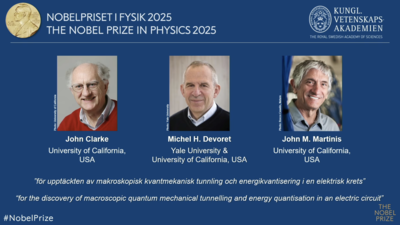
The Royal Swedish Academy of Sciences has announced the 2025 Nobel Prize in Physics, awarded to John Clarke, Michel H. Devoret, and John M. Martinis for their groundbreaking contributions to macroscopic quantum phenomena in superconducting circuits. Their experiments have made it possible to observe quantum mechanical effects such as tunnelling and energy quantisation in systems large enough to hold in the hand, bridging the microscopic and macroscopic worlds of physics.
What they won the Nobel for
The trio was recognised “for the discovery of macroscopic quantum mechanical tunnelling and energy quantisation in an electric circuit.” Through a series of meticulous experiments, they demonstrated that superconducting circuits can exhibit quantum behaviours previously thought to be limited to atoms and subatomic particles. Their work showed that such systems could tunnel between states and absorb or emit energy in discrete amounts, confirming predictions of quantum mechanics and laying the foundation for modern quantum computing.
John Clarke
John Clarke completed his BA, MA, and PhD in Physics at the University of Cambridge, studying at Christ’s College and Darwin College between 1964 and 1968. His doctoral research focused on superconductivity and quantum interference devices, establishing him as a pioneer in superconducting electronics. Clarke’s education provided him with a deep understanding of quantum theory and experimental techniques, which became crucial for his later work demonstrating macroscopic quantum tunnelling.
Michel H. Devoret
Michel Devoret graduated from the École Nationale Supérieure des Télécommunications in Paris in 1975. He then pursued an MSc in Quantum Optics from the University of Paris-Sud (Orsay) in 1976, followed by a PhD in Solid State Physics from the same university in 1982. Devoret further honed his research skills during a postdoctoral stint at John Clarke’s lab at UC Berkeley, where he conducted key experiments on macroscopic quantum tunnelling. His international academic training equipped him to merge theoretical physics with practical experiments.
John M. Martinis
John Martinis received his BS (1980) and PhD (1987) in Physics from the University of California, Berkeley. His doctoral research pioneered the study of quantum-bit states in superconductors, work that would later become foundational in the field of quantum computing and superconducting qubits. Martinis’ education at Berkeley, combined with hands-on laboratory experience, enabled him to contribute critically to the experiments that ultimately earned the Nobel Prize.
Education as the foundation for discovery
The educational journeys of Clarke, Devoret, and Martinis highlight the importance of rigorous academic training, mentorship, and access to advanced research facilities. Their university experiences laid the groundwork for experiments that not only advanced fundamental physics but also enabled technologies such as quantum computers and circuit quantum electrodynamics (circuit QED).By combining theoretical knowledge with experimental expertise, the 2025 Physics laureates have shown how a strong academic foundation can lead to discoveries that reshape our understanding of the physical world.








